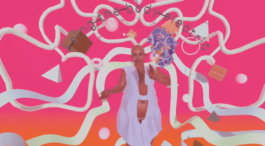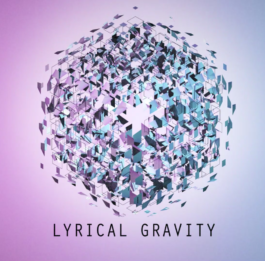
TITLE
Lyrical Gravity
ARTISTS
Matteo Marziano Graziano, Linards Kulless, Zoe Goldstein, Yuri Shimaoka, Matias Brunacci, Polina Zinziver, Michael Tane, Sabine Huschka, Jacqueline Wong, Samuel Hertz, Alexandra Tryanova and Nikita Khudiakov.
PLACE
Online
DATES
01.09.20 — 01.05.2021

LYRICAL GRAVITY is a multiplayer VR artwork that approaches Virtual Reality as a participatory theatrical experience in the digital space. By speculating on a fictional kind of gravity, it makes use of pop songs and their lyrics as psychoacoustic gates for triggering embodied memories and dormant affects, while leading the users on a sensorial somatic experience into the realm of instinct, intuition and desire within the VR space. LYRICAL GRAVITY is an immersive theatrical experience that makes use of a contemporary western music dramaturgy to retrace the fundamental relational forces that move us as a collectivity as we strive for shared empowerment and political self-determination. Pop hits allow access to deeper affective states—joy, fear, surprise, disgust, anger, arousal, excitement, tranquility—redeeming affections, playfulness, touch and solidarities in the collective dreaming of post-pandemic sustainable scenarios. This return to collective affect opens up a performative field in which negotiations between body states, emotional scripts and cognitive processes arise from the embodiment of language through song inside of the VR space.
LYRICAL GRAVITY makes you levitate to a different affective realm. This gamified somatic VR experience asks a direct question: when we hear, read, feel the lyrics of a song that is emotionally touching — when we are touched, what is it that it's being touched? when we are moved, how can we use that movement for a collective writing of the story of our times? LYRICAL GRAVITY is a provocative love experience and performative encounter in an unorthodox karaoke style. LYRICAL GRAVITY brings the user to a deeper level of their personal emotional geography poking their heart with poetic power through sound resonance, energetic vibrations, and pop song fragments.
LYRICAL GRAVITY is a transdisciplinary digital performance by Matteo Marziano Graziano around songs and the affective power of lyrics, built as a hybrid VR happening in interaction with a digital framework that includes four open labs, a dedicated website, and a digital public program.
Supporters
LYRICAL GRAVITY is funded by the Berlin Senate for Culture and Europe.
LYRICAL GRAVITY is supported by the European Union under the House of Europe program.
LYRICAL GRAVITY OPEN LABS
LYRICAL GRAVITY kicks off by offering four digital Open Labs, tailored for artists and art professionals and led by experts of the creative digital industry, in order to explore the potential of virtual worlds applied to your artistic practice, in the balance between artistic vision, technical feasibility and user-friendliness.
Performative art in Virtual and Augmented Realities | September 2020
3D Modelling using Blender | September 2020
Virtual Worlds Design | October 2020
Sound in Virtual Visual Worlds | October 2020
PERFORMATIVE ART IN VIRTUAL AND AUGMENTED REALITIES
During the course you will learn the fundamentals of Virtual Reality (VR) and Augmented Reality (AR) as media and their current state. We will tackle and analyse 10 different cases of performative art in VR and AR and how they were designed and produced. In small groups of 3 participants, you will be able to develop a solid concept of performative art in VR, in dialogue with your mentor as well as through peer-to-peer feedback. You will finish the course knowing how to imagine, concept design and pitch a VR / AR performative artwork.
Dates and time slots: Tuesdays 1, 8, 15, 22, 29 of September from 10:00 to 12:30 (CET)
Format: Online, Zoom.
Equipment: Computer, webcam, microphone.
Experience in one or several of these fields is welcome: Performative art, VR/AR, contemporary art, cultural analysis.
Level: Open
Mentor: Daryna Fes (http://www.darynafes.space/) is an independent media artist based in Ukraine and working primarily with interactive VR. Main themes of her projects are differences and similarities between physical and digital worlds, ways of transition from one world to another and our [un]awareness of it, concepts of infiniteness and limits, perception of the human body and emotions. She is using game engines (Unity and Unreal Engine) to program environments that react to the viewer's presence.
Guest Lecture by AΦE (http://www.aoiesteban.com/). “Backward process analysis of a XR creation, from the day of premiere to concept development.” AΦE (Aoi Nakamura and Esteban Fourmi) is an Ashford-based dance company founded by Aoi Nakamura and Esteban Lecoq with the vision to incorporate technology into the theatre experience and bring audiences closer to the art of dance, using primarily Virtual Reality (VR) and Augmented Reality (AR).3D MODELLING USING BLENDER
This practical course is suited for learning how to create 3D models for virtual spaces at Mozilla Hubs (a free virtual online platform). We will work in Blender and use Mozilla Hubs plugin. Each participant will make one 3D model art piece that will be presented in the shared exhibition at the end of this course, hosted within a digital hub. This course can be most interesting for those who already have some experience of working in 3D but also want to develop these skills in context of contemporary art and media arts.
Dates and time slots: Thursdays + Saturdays 3, 5, 10, 12, 19 of September from 15:00 to 17:30 (CET)
Format: Online, Zoom calls and meetings in Mozilla Hubs.
Equipment: Computer, webcam, microphone. It’s better to have a mouse (touchpad is not so suitable for work with 3D).
Required software: Blender 2.83 (free).
Experience in one or several of these fields is welcome: 3D modelling, sculpture, game development, performative art, VR/AR, contemporary art, cultural analysis, animation, visual arts and graphics, graphic design, architecture,
Level: Open
Mentor: Marco Modena is a digital designer based in Verona (Italy). He is an executive manager in Algoritmi’s Hubs projects: TheDome, TheCircle, Algo24. Working as 3D Architectural Visualizer and Graphic Design Consultant. In June 2020 he was teaching Blender tips and tricks inside Hubs for ACADEMY 2020: an Algoritmi & UXR Project.
VIRTUAL WORLDS DESIGN
During this course, participants will learn about the basics of composing 3D spaces, get acquainted with the Spoke editor tools, design and create their own virtual space in teams. These will be published in Mozilla Hubs. Upon completion of the course, all participants will be able to visit each other's spaces and invite other users to their virtual worlds. Participants will also learn how to create 3D spaces so that it is convenient to navigate through it, get acquainted with examples of various Mozilla Hubs virtual spaces and explore the topic of virtual space as an artistic project and practice.
Dates and time slots: Thursdays 8, 15, 22, 29 of October, 5 of November from 10:00 to 12:30 (CET)
Format: Online, Zoom calls and meetings in Mozilla Hubs
Equipment: Computer, webcam, microphone. It’s better to have a mouse (touchpad is not so suitable for work with 3D).
Experience in one or several of these fields is welcome: VR/AR, game development, architecture, scenography, 3D modelling, sculpture, performative art, contemporary art, cultural analysis, visual arts and graphics, graphic design.
Level: Open
Mentor: Daryna Fes (http://www.darynafes.space/) is an independent media artist based in Ukraine and working primarily with interactive VR. Main themes of her projects are differences and similarities between physical and digital worlds, ways of transition from one world to another and our [un]awareness of it, concepts of infiniteness and limits, perception of the human body and emotions. She is using game engines (Unity and Unreal Engine) to program environments that react to the viewer's presence.
SOUND IN VIRTUAL VISUAL WORLDS
The course will focus on sound and audio, and how these relate to virtual worlds. Participants will learn the fundamentals of audio-visual art, and its history. In small groups, you will be able to create an audio-visual installation in the virtual online space of Mozilla Hubs. Several virtual audio-visual spaces will be visited, discussed and analysed in the group. You will learn how to locate sound sources in space and adjust the parameters of sound propagation in virtual space. The course ends with an online exhibition with the works of the participants, published on Mozilla Hubs and available for your portfolio.
Dates and time slots: Tuesdays 6, 13, 20, 27 + Saturday 31 of October from 10:00 to 12:30 (CET)
Format: Online, Zoom calls and meetings in Mozilla Hubs
Equipment: Computer, webcam, microphone. It’s better to have a mouse (touchpad is not so suitable for work with 3D).
Experience in one or several of these fields are welcomed: Sound art, music production, VR, media art, game development, architecture, scenography, 3D modelling, performative art, contemporary art, cultural analysis.
Level: Open
Mentor: Alexandra Cardenas is a Colombian composer and improviser now based in Berlin, who has followed a path from Western classical composition to improvisation and live electronics . Her recent work has included live coding performance, including performances at the forefront of the Algorave scene, she also co-organised a live coding community in Mexico City. At the 2014 Kurukshetra Festival Cardenas was a keynote speaker and hosted a music live coding workshop, the first of its kind in India. Cardenas has been invited to talk about and perform live coding at events such as the Berlin based Transmediale festival and the Ableton sponsored Loop symposium, and held residencies including at Tokyo Wonder Site in Japan and Centre for the Arts in Mexico City.
© 2024 Alexandra Tryanova